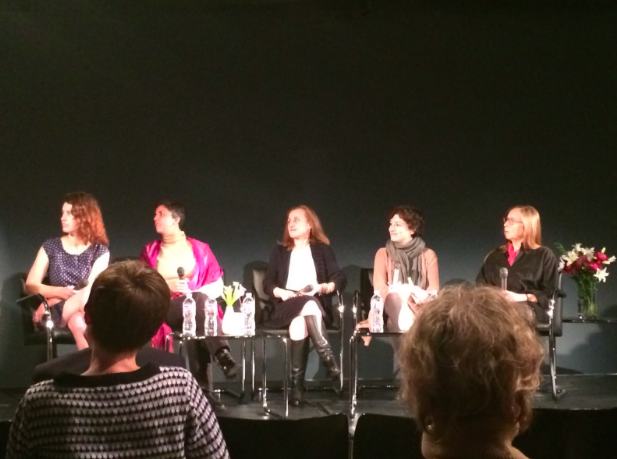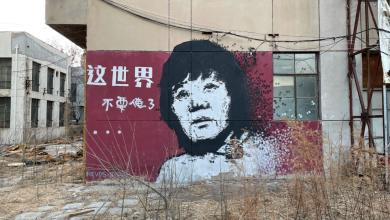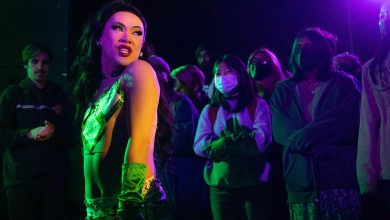Literature and Gender: An Important Conversation at the Hammer

On the evening of December 2nd, 2014, The Hammer Museum hosted a panel titled “Literature & Gender.” The panel was led by Mona Simpson, acclaimed novelist, professor at UCLA and organizer of Hammer Series, Some Favorite Writers, and Carmen Giménez Smith a poet and representative from VIDA – an organization that is at the forefront of the conversation about women in literature. It also featured Elaine Blair, essayist and contributor to the New York Review of Books, Ruth Franklin, essayist and contributor to The New Republic, and Michelle Huneven acclaimed novelist, professor at UCLA and editor at the Los Angeles Review of Books.
Compared to other Hammer Museum literary events, attendance was notably scant. This could have been because of a lack of interest in the topic or because of the heavy, surprising rain. Mona Simpson joked that in Los Angeles, this was the equivalent of a monsoon.
There were several key questions and remarks throughout the conversation but since you can find the entire conversation here (if you have time, you should watch it), the following illustrates some of the key ideas.
VIDA is a “research-driven organization” that seeks to raise critical awareness about gender (in)equality in today’s literary culture. It was founded in 2009 (as Willa) by Kate Marvin and Erin Belieu. They noticed that the literary “gatekeepers” (that is, tastemaking publications like the New Yorker and the Paris Review) favored men in terms of who was being published, reviewed and celebrated. Every year since, they have come out with statistics detailing the ratio of men to women in these magazines, unofficially known as “the VIDA count.” Carmen Giménez Smith, the representative from VIDA, shared that the VIDA count has really helped shape the conversation around literature and gender, though they hadn’t expected it to have the effect it did.
The panelists shared that they’d all heard the sentiment that publications tried to be gender blind; it just so happens that 75% of the people whose voices are being heard are men. Ruth Franklin saliently remarked that this explanation was disingenuous. She asked: who defines criteria? Michelle Huneven warned against the myth of the objective “transom”: reading is subjective and if you have a male-dominated staff and a culture that favors men, the stories that will resonate will be those by men, whether or not their female counterparts are writing their hats off. Elaine Blair shared the example of an orchestra that tried really hard to make its auditions as gender blind as possible and was surprised when it was suddenly flooded with women. There are no gender blind auditions in writing, the panelists lamented. “Gender blind is like race blind,” said Mona Simpson. “There’s really no such thing.”
The panelists discussed unconscious bias for a little while and the clumsiness of trying to remedy things especially since women because of socialization were less likely to be persistent in their pursuit of literary success, and soon it felt like they were hitting a wall. Carmen Giménez Smith then said: “Change is hard, change is difficult. All of us have to do something. As editor, write back [to a woman who might be losing faith], why don’t you just write me something?”
On the subject of reviews, Michelle Huneven mentioned that Elaine Blair and Ruth Franklin as book reviewers made a point of reviewing both male and female authors. “I just wish there were more men who felt it was important to write about female writers,” she said. Elaine Blair responded that it might be more difficult for male writers to feel the freedom to generalize about women the way she felt when writing about men, because, as Ruth Franklin remarked, of the inherent power they have. Mona Simpson responded: “I’m not sure that men are politically inhibited or they’re just not attentive enough to do that to female writers.” Franklin gave the example of a male reviewer Billy Giraldi who did a “hatchet job” on a female writer Alix Ohlin’s work. Carmen Giménez Smith offered that in situations like these conversations ensue. It will be a difficult and painful process, but it is necessary.
The Q&A portion of the event was extremely lively with a range of questions raised and comments made. An older woman in the audience shared that she’d been having the same conversations with her friends Betty Friedan and Erica Jong (she was so flippant about it!) in the 60s and 70s and how unfortunate it was that the problem wasn’t solved as they’d thought. A student of color asked how women of color writers could stay encouraged when they had more than their gender working against them. English student, Ivan Escobedo, asked another question that had been on all our minds: why was there no male panelist? Mona Simpson answered that she had asked the writer Jeff Eugenides but he was busy. It would have been useful to see whether or not men critiqued their privilege in the literary world and their understanding of how gender figured into things.
Ultimately, the discussion was very interesting but the panelists, as well as the audience ourselves, didn’t step up to the challenge of the introduction presented by Magdalena Edwards. She had set the wheels in motion with two particularly poignant questions: if literature is a conversation, how can we have a conversation, when not everyone is at the table? And how do the categories of ‘women’ and ‘men’ limit us? There were many voices missing from the panel, most notably those of queer women, and writers who might not identify as male or female. The panel did boast the fantastically broad title, “Literature & Gender.”




